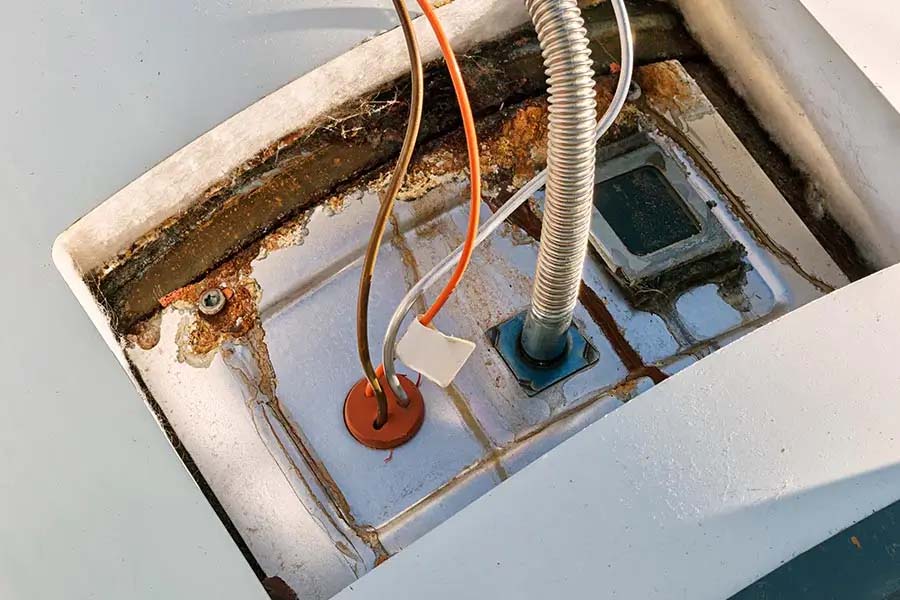Like a ticking time bomb, your water heater can signal trouble long before it fails completely. If you’ve noticed any strange sounds, discolored water, or inconsistent temperatures, it might be time to pay closer attention. Ignoring these signs could lead to more than just cold showers. Let’s explore what to look out for and how you can protect your home from a sudden water heater crisis.
Unusual Noises Coming From the Heater
If you hear unusual noises coming from your water heater, it’s a sign that something might be off. Rattling, popping, or hissing sounds can indicate sediment buildup or internal issues.
These noises often suggest that the heating element is working harder than it should, which can lead to a complete failure if not addressed. Ignoring these sounds might cause more significant problems, including leaks or even water damage.
You should investigate the source of the noise as soon as possible. Checking the heater’s manual can provide insights, but it’s best to call a professional if you’re unsure.
At Benjamin Franklin Plumbing of Fort Worth, our team is ready to help. We can diagnose the issue and recommend the best course of action. Licensed and certified technicians are available to ensure quality service and peace of mind.
Don’t wait until it’s too late; take action now to guarantee your water heater continues to function efficiently and reliably.
Discolored or Cloudy Water
Discolored or cloudy water can be a troubling sight, signaling potential issues with your water heater.
When you notice this change, it’s crucial to address it promptly. Here are three possible causes you should consider:
- Rusty Pipes: If your pipes are old or corroded, they may leach rust into your water, causing discoloration.
- Sediment Buildup: Over time, mineral deposits can accumulate in your tank, leading to cloudy water. This buildup can affect your water quality and heater efficiency.
- Water Heater Failure: A failing water heater may cause various issues, including discoloration, indicating it’s time for a professional inspection.
Don’t wait until it’s too late.
If you notice discolored or cloudy water, Contact Benjamin Franklin Plumbing of Fort Worth for expert assistance. They can help diagnose the problem and guarantee your water heater operates safely and efficiently. Their team offers ongoing support and maintenance services to ensure your hot water needs are continually met.
Inconsistent Water Temperature
Noticing discolored or cloudy water can be alarming, but inconsistent water temperature may be an even more immediate concern.
If you’re experiencing sudden changes in water temperature—like a hot shower turning cold without notice—this could indicate a problem with your water heater. You might find that water is scalding hot one moment and barely warm the next, making it difficult to enjoy your daily routines.
This inconsistency can stem from various issues, such as a malfunctioning thermostat, sediment buildup, or a failing heating element.
If left unaddressed, these problems can disrupt your comfort and lead to more significant issues. Professional plumbing ensures that such issues are diagnosed accurately and resolved effectively to prevent further complications.
If you’re facing temperature irregularities, it’s essential to act quickly.
Contact a professional plumbing service like Benjamin Franklin Plumbing of Fort Worth to diagnose and resolve the issue before it escalates into a complete failure.
Your comfort and safety depend on it!
Leaks or Puddles Around the Unit
Water heaters can sometimes give you subtle hints that they’re on the verge of failure, and one of the most telling signs is the presence of leaks or puddles around the unit.
If you notice water pooling or dripping, it’s crucial to address the issue immediately. Ignoring it could lead to more significant problems, including water damage or even mold growth.
Here are three things to check if you spot leaks:
- Inspect the connections: Verify all the inlet and outlet connections are tight and secure. Loose fittings often cause leaks.
- Look for corrosion: Examine the tank for rust or corrosion. These signs can indicate that the tank is deteriorating.
- Check the pressure relief valve: If it’s leaking, your water heater may be under too much pressure, signaling a need for professional help.
Additionally, if you experience high water bills, it may be a sign of underlying plumbing issues that require immediate attention. Don’t wait—address leaks promptly to maintain your home’s safety and comfort!
Age of the Water Heater
One major factor in the reliability of your water heater is its age. Most traditional water heaters last about 10 to 15 years, while tankless models can last up to 20 years.
If your age nears or surpasses, it’s time to start paying attention. As water heaters age, they become more prone to issues like leaks, rust, and sediment buildup. You may notice a decline in efficiency, leading to higher energy bills and an inconsistent hot water supply.
Regular maintenance can help extend its lifespan, but it won’t stop the inevitable. If your water heater is aging and showing signs of wear, consider replacing it before a complete failure occurs.
Catching this early can save you from unexpected cold showers and costly repairs. If you’re unsure about your unit’s condition, reach out to Benjamin Franklin Plumbing of Fort Worth for an expert assessment.

Conclusion
Just like a tree that shows signs of decay before it falls, your water heater gives you clues before it gives out. If you notice unusual noises, cloudy water, temperature inconsistencies, leaks, or it’s nearing the end of its lifespan, don’t ignore these signals. By addressing these warning signs now, you can prevent a bigger disaster later, ensuring your home stays warm and comfortable, just like a sturdy tree standing tall through every storm.

